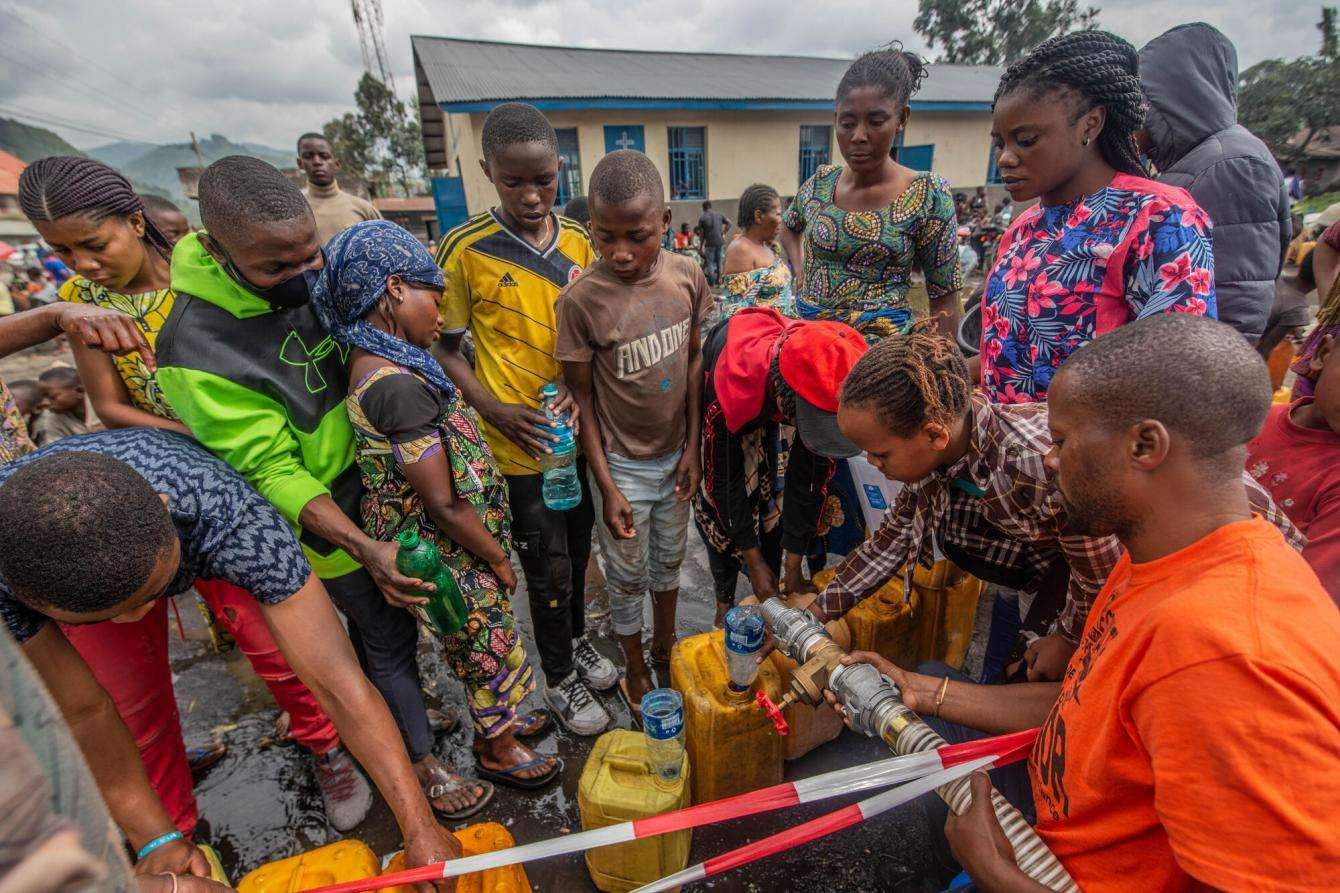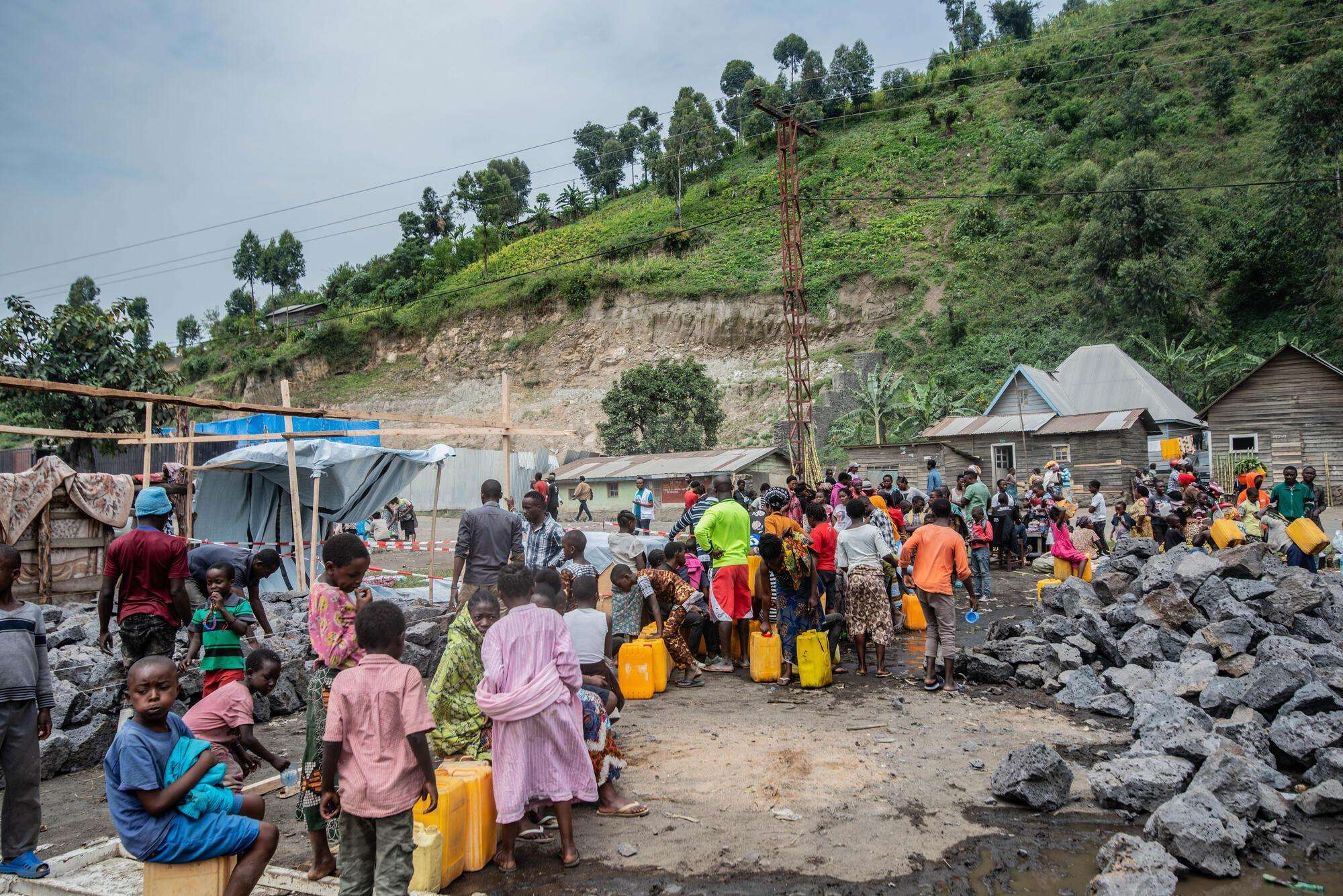This article was updated on June 10, 2021 to provide more information about the Doctors Without Borders/Médecins Sans Frontières (MSF) response in the region.
As nearly half a million people are newly displaced and without clean drinking water following the eruption of Mount Nyiragongo in Democratic Republic of Congo (DRC), MSF is calling on other humanitarian organizations to urgently step in to help meet people’s basic needs.
“We are assisting the immediate needs of displaced people, but it is not enough,” said Magali Roudaut, MSF head of mission in DRC, where the organization is responding in the cities and towns of Goma, Sake, and Rutshuru. “We demand urgent support of other humanitarian organizations to assist people.”

The volcano erupted on May 22, sending lava toward the densely populated city of Goma, in North Kivu province, destroying four villages north of the city and affecting several others, as well as setting off a series of tremors and minor earthquakes that forced people to flee for safety. MSF teams are providing medical services in the nearby town of Sake, where between 100,000 and 180,000 people are gathering in churches, schools, mosques, and on the streets. We are providing access to hygiene and sanitation facilities in Goma and supporting health services in other parts of North Kivu.
People who have been affected by the disaster are in immediate need of food, latrines, shelters, blankets, and jerrycans to collect clean water. Clean water is especially critical in settlements for displaced people, as conditions can fuel the spread of deadly waterborne illnesses like cholera. “More clean water should be urgently provided. Cholera is endemic in the area and poses a huge threat to people, including to the host communities,” Roudaut said.

Hundreds of thousands displaced and without clean drinking water
The eruption of Mount Nyiragongo, considered the most dangerous volcano in Africa, has resulted in the deaths of 31 people, according to the UN Office for the Coordination of Humanitarian Affairs (OCHA).
Several buildings have been severely damaged or have collapsed, including health structures, as well as water and electricity supply systems in some areas of the city. More than 500,000 people have been deprived of access to drinking water as Goma’s main reservoir and pipes were damaged during the eruption.
Approximately 400,000 people have been displaced and are on the move, fearing the continuous seismic and volcanic activity. “We have seen a steady flow of people leaving Goma carrying mattresses and other belongings,” said Roudaut. “They go either by car or on foot towards Sake, a city approximately 15 miles [25 kilometers] west of Goma, as well as towards Rutshuru, Minova, and Kirotshe, or by boat to Bukavu.”
Some people have also crossed the eastern border of DRC into neighboring Rwanda. Although movements of people slowed down at the start of last week, authorities’ order for the partial evacuation of Goma on May 27 led to the departure of hundreds of thousands more people.
Providing medical care and preventing cholera
MSF teams in the area are focused on preventing the spread of cholera, treating patients with the disease, and undertaking epidemiological surveillance in the region. MSF is also providing drinking water, scaling up storage capacity to 125,000 liters, which can be refilled by trucks depending on people’s daily consumption. Additionally, in Sake, MSF installed 26 chlorine dispensers in key locations in town and close to water supply sources to provide even more clean water to the people there.
Teams are also providing medical care to people in health centers and hospitals supported by MSF, carrying out 202 primary health care consultations on just the first day of the emergency response in Sake. From May 28 to 31 MSF carried out more than 1,000 medical consultations in Sake. People from the internally displaced people’s settlement have been admitted to the cholera treatment center with suspected cases, but all test results came back negative since May 21. We will continue to monitor the risk of cholera.

Providing health care and essential services across North Kivu
In Goma, MSF is supporting the provincial reference hospital with donations of equipment and drugs. We are also providing access to hygiene and sanitation facilities in Goma, where teams are building latrines for displaced people. MSF has donated equipment, drugs, and 100 mattresses to the Goma provincial hospital in order to improve hospital conditions. MSF is also carrying out active surveillance and monitoring for cholera in health areas in and around Goma, where we were present before the eruption. We are also running health promotion to prevent cholera outbreaks and inform communities about how to access health facilities.
Additionally, on the road between Goma and Rutshuru—which had been closed off by lava but is now open—MSF is supporting existing clinics and has set up an additional emergency ward approximately four miles [six kilometers] from the lava flow. Teams there conducted approximately 170 consultations between May 29-31, and are also providing water to a health center and hospital.
In Sake, MSF installed water bladders to distribute clean water for both displaced people and the host community. Chlorine dispensers have also been installed in key locations throughout the town and close to water supply sources. More latrines and waste disposal sites have been built near sites for displaced people.
We are also providing medical consultations and treatment, referrals to secondary health care, and community outreach and health promotion. MSF teams are currently carrying out 500 medical consultations daily for both displaced people and the host community.
Sake's cholera treatment center has received patients suffering from suspected cholera. From May 23 to June 8, 63 cases of diarrhea were admitted for observation. So far only one case of cholera has been confirmed. Nonetheless, MSF is collaborating with the Ministry of Health on disease surveillance.
In Rutshuru, North Kivu, which hosts 77,000 of the people displaced by this eruption, MSF is supporting the hospital and two health centers in the neighborhood, conducting more than 50 consultations in each structure daily. Teams are providing basic health care and referring more complicated cases to Rutshuru’s hospital, as well as constructing water and sanitation infrastructure. From May 29 to June 8, 1,809 total consultations were carried out. We have also begun construction of water and sanitation infrastructure to respond to the needs of some 3,000 displaced people who are sleeping in stadiums in Rutshuru and Kiwanja.
MSF is also working to limit the impact of the disaster on the patients we assist across 12 projects supported in coordination with the Ministry of Health in North Kivu, South Kivu, and Maniema provinces.
For example, as many people return to Goma, MSF is supporting health centers in the city with free primary health care consultations, medicine, and hygiene items. Additionally, we remain committed to supporting our HIV-positive patients in Goma by ensuring the continuation of antiretroviral therapy in the health centers we supported before this eruption.
How you can help
Not everyone can treat patients in the field. But everyone can do something.
Some humanitarian crises make the headlines—others don’t. Unrestricted support from our donors allows us to mobilize quickly and efficiently to provide lifesaving medical care to the people who need it most, whether those needs are in the spotlight or not. And your donation is 100 percent tax-deductible.




